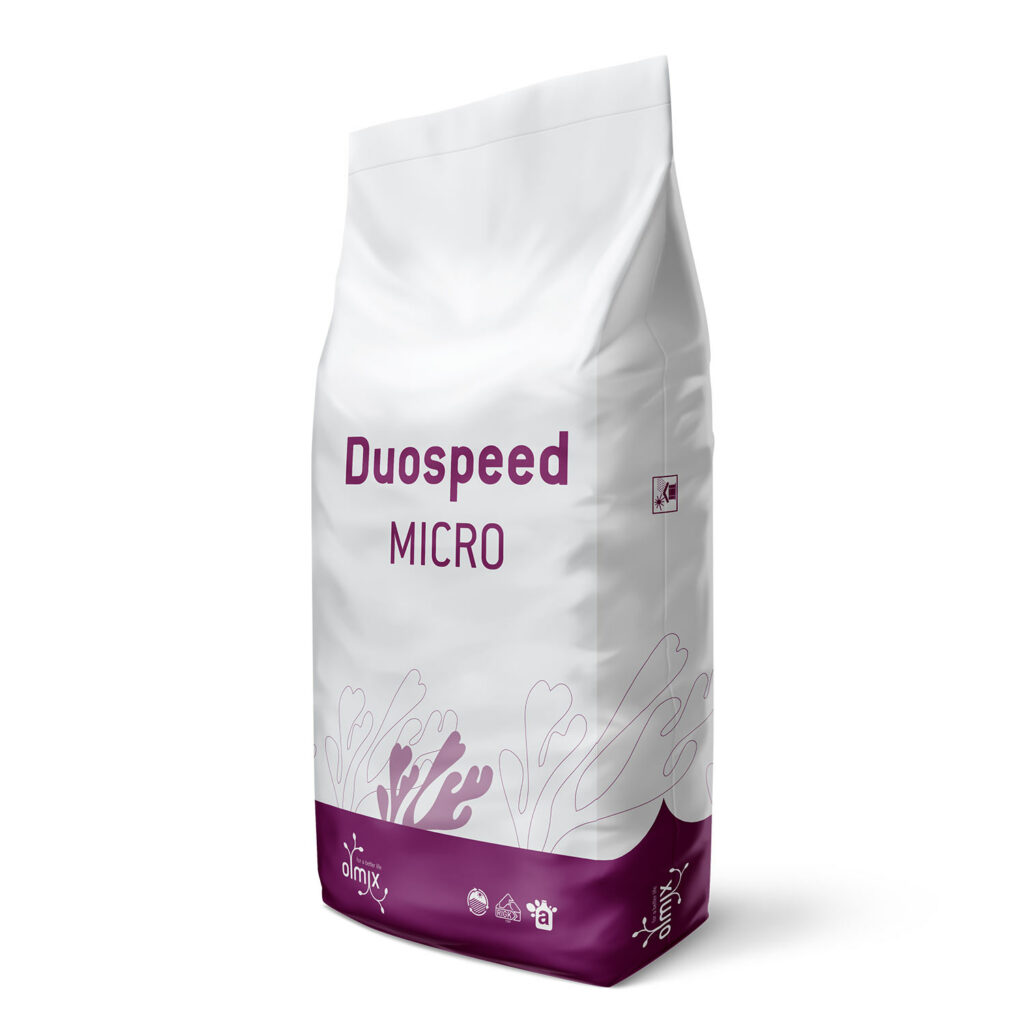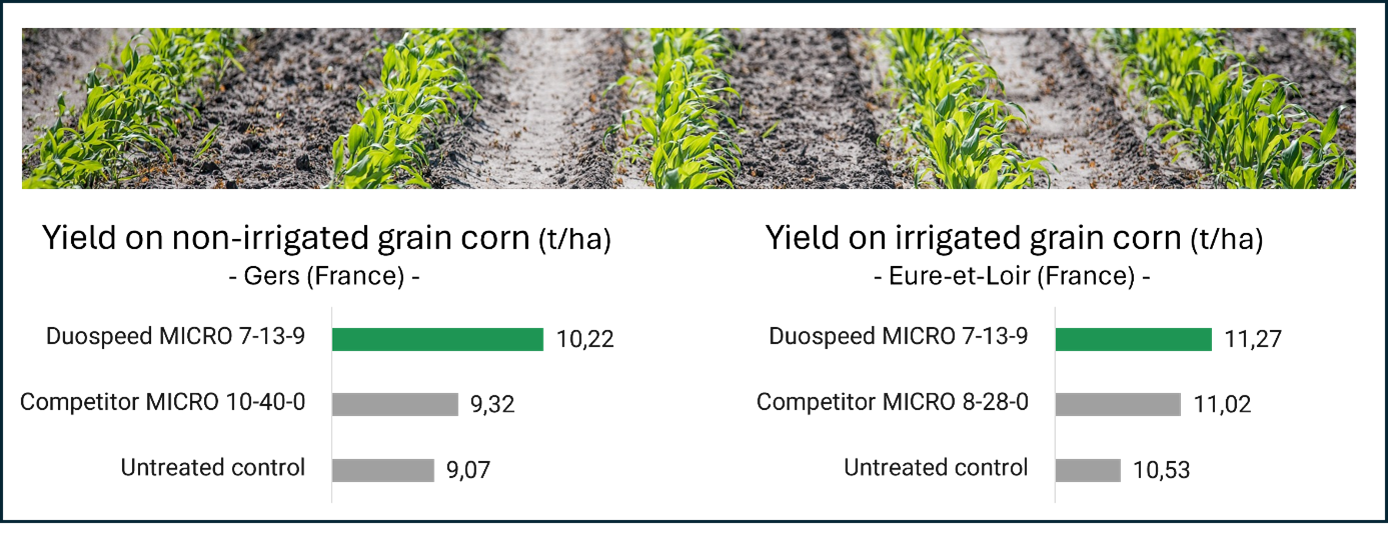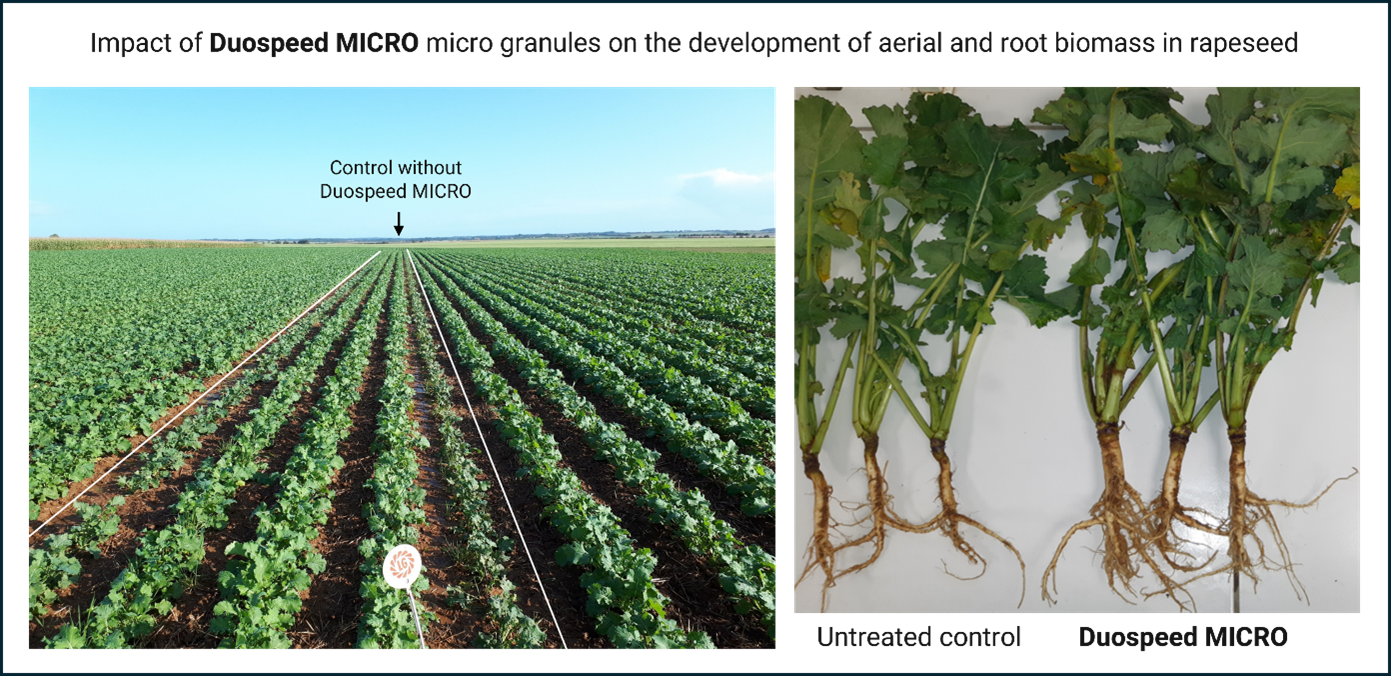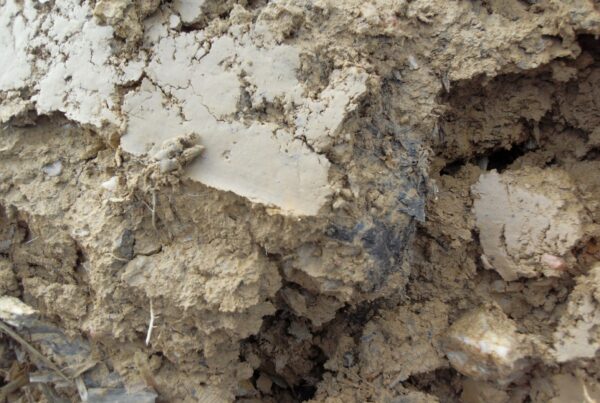Depending on fields and years, yields fluctuate with climate, soil types and the ability of crops to uptake sufficient water and nutrients. While we have little control over the first two parameters, the plant’s ability to feed itself can be improved through the quality of its root system.
The supply of nutrients close to the seed when seeding offers the young plant a directly assimilable nutritional resource in order to quickly develop its root system and its ability to explore the soil. Thus, the Duospeed MICRO rooting stimulator located at seeding secures the plant’s juvenile phase and crop establishment and limits the risk of loss of potential.
Duospeed MICRO, organo-mineral micro granules for root stimulation
Duospeed MICRO’s hybrid composition (organic and mineral) combines the benefits of plant nutrition and stimulation of soil microflora.
Minerals to feed the plant
The NPK 7-13-9 + 10.7 SO3 balance of the Duospeed MICRO formula gives priority to soluble phosphorus for its rapid action on root system development by stimulating cell growth at the tips of young roots. As phosphorus is not very mobile in the soil, locating it close to the seed considerably increases its efficiency.
The nitrogen contained in Duospeed MICRO comes in three forms with different kinetics of action: organic, ureic and ammonia. This feature enables nitrogen nutrition to be spread out over a long period, bearing in mind that the plant’s needs are low until the 6-8 leaf stage. The advantage of such a configuration is to protect nitrogen from leaching.
Potassium is the mineral element that plants need most quickly. Less mobile than nitrates and sulfates, it is located close to the seed to meet the crop’s very first needs.
Finally, sulfur, supplied in sulfate form, secures the plant’s initial needs in sandy or very filtering soils, particularly for spring crops after a rainy winter.

Organic ingredients to stimulate soil microflora
From the germination, the plant begins a “dialogue” with the soil microorganisms. This interaction leads to the selection of a population of bacteria and fungi that will develop around the roots to form the rhizosphere. Thus, the concentration of microorganisms becomes significantly higher near the roots compared to the rest of the soil. This “recruitment’ of microorganisms by the plant promotes the assimilation of the nutrients and ensures a buffer effect for the pH (neither too acidic nor too alkaline), humidity and other physico-chemical parameters.
Located close to the seed during sowing, the organic component of Duospeed MICRO helps build up the rhizosphere by providing easily degradable organic matter and through the action of specific compounds contained in SEADRY® seaweed extract.
Indeed, seaweed contains rare trace elements such as vanadium, essential for nitrogen-fixing microorganisms, as well as sulfated polysaccharides that facilitate root mycorrhization by fungi.
Duospeed MICRO: the impact of better crop start-up on yields
Field trials have demonstrated the effectiveness of Duospeed MICRO 7-13-9 micro granules on various crops.
On corn, Duospeed MICRO optimizes crop nutrition by developing the root system. The result is more consistent yields, with gains of up to 12% compared to a situation without microgranular fertilization.

On sunflowers, yield gains of up to 15.5% were measured compared to the control without microgranular fertilization.
While the benefits of micro-localized fertilization are easy to see in spring crops, given their shorter cycle and the need to avoid late start-up, it is also proving its worth in autumn crops. Below, in this field of rapeseed in Charente-Maritime (France), the visual difference observed in autumn illustrates the improved development of biomass.

Pre-winter measurements show a 49% increase in leaf biomass for the Duospeed MICRO plot compared with the control, and a 1.6-fold increase in root weight. At harvest, yield was 3.5% higher than the control without microgranules.
Prioritizing situations where nutritional supply is limited
Duospeed MICRO micro-granule fertilization is particularly recommended when soil and climatic conditions are limiting:
- Conditions that hamper nutrient bioavailability: cold soils or climatic conditions, acid or alkaline pH, etc.
- Light, filtering soils that retain little of the mineral elements sensitive to leaching.
- Cultivation practices that limit soil heating and mineralization, such as direct seeding
- Soils with low levels of certain nutrients (impasses to fertilizers, insufficient organic restitutions, etc.).
In these circumstances, supplying bioavailable nutrients close to the young roots supports seedling development and secures crop establishment.
In this way, Duospeed MICRO organo-mineral fertilization increases root exploration capacity, making better use of the nutrient resources present in the soil, and reducing the use of mineral fertilizers, the production of which is a major source of greenhouse gas emissions.



